Attitudes of Consumers Towards Organic Products in Bhopal City
Nilima Varma1 *& Rashmi Punjabi Anand2
1Professor, Department of Food and Nutrition
Govt. Sarojini Naidu Girls PG (Autonomous) College, Bhopal, Madhya Pradesh, India
2Research Scholar, Barkatullah University, Bhopal, Madhya Pradesh, India
*Email: nvarma44@gmail.com
Introduction
The term “organic” can be broadly described as food grown without assistance of manmade chemicals. There is no common definition of organic due to the fact that different countries have different standards for products to be certified “organic”. In general “organic” is a production system that sustains the health of soils, ecosystem and people. It relies on ecological processes, biodiversity and cycles adapted to local conditions, rather than the use of inputs with adverse effect. Due to increasing consumer dissatisfaction with conventional foods and increasing environmental and health concerns about intensive production process in the last few years, consumer behaviour towards organic products has attracted growing research attention.
Recent trends in final food demand show that the concept of food has undergone a radical transformation in recent years to the point to assign to food, in addition to their nutritional and sensory properties, also play an important role in the maintenance of health, on psycho-physical well-being and prevention of certain diseases. Today foods are not intended to only satisfy hunger and to provide necessary nutrients for humans but also to prevent nutrition-related diseases and improve physical and mental well-being of the consumers. Although the concept of “organic food” seems to be well known to many consumers, the proportion of consumers who purchase organic foods on a regular basis is low. The increased consumer interest in organic food has been attributed among others to the growing demand for food free from pesticides and chemical residues.
Organic products are obtained by processes friendly to the environment, by cultivation techniques that consider both the attributes of the final product and the production method. Thus, increasing demand for organic food is expected to continue in the future. A variety of factors that can potentially influence organic food consumption have been identified in relevant literature. Concern for health, environmental protection, and chemical residues in conventional food products, pesticides, nutrients, as well as improved taste and flavor in organic products are some of the factors identified.
Health concern appears as the most important reason for purchasing and consuming organic food. Environmental concern, although not a priority issue seems to affect consumption of organic products. Previous experience with organic food seems to positively affect attitudes towards organics. In any case, the importance of individual factors appears to be countries specific and/or time specific. Even in cases where similar attitudes between different countries were depicted, cultural differences lead consumers to seek different values when making purchasing decisions on organic food. The socio-demographic profile seems to affect consumer attitudes and buying behavior towards organic food. Attitudes towards organic food are mainly influenced by gender, age, income, level of education and the presence of children in the household.
In particular, organic food buyers tend to be younger than non-buyers .Women seem to be more interested in organics than men, and they are more frequent buyers than men. Overall, more positive attitudes towards organic food have been detected in women as opposed to men. Age also seems to affect consumer attitudes towards organic food. Young people are more environmentally conscious but less willing to pay more due to their lower purchasing power, whereas older people are more health conscious and more willing to pay an extra price for organic food. Education has also been reported as a significant factor affecting consumer attitudes towards organic food products. People with higher education are more likely to express positive attitudes towards organic products; require more information about the production and process methods of organics, have the confidence to negotiate conflicting claims in relation to organic food and are more willing to pay a premium for organic food. Moreover, demand for organic food seems to be positively correlated to income. Higher income households are more likely to form positive attitudes and to purchase more organic food. However, income appears to affect mainly the quantity of organic products bought and not the general willingness to buy. Higher income households do not necessarily indicate higher likelihood of organic purchases. Some lower income segments seem to be more entrenched buyers. The presence of children in the household has also been regarded as a significant factor, which positively influences consumers’ organic food attitudes as well as buying behavior. However, children’s age can be considered as a key factor, meaning that the higher the age of children in the household, the lower the propensity to buy organic food. It is generally recognized that there are also numerous barriers to the diffusion of environmentally friendly products, such as organic food, despite the green trend in consumer values and attitudes. The most common barriers stressed in the marketing literature include consumer’s reluctance to pay higher costs, both in terms of money and in time and effort, their skepticism regarding the higher quality of these products and the lack of availability of these products. A major repercussion in buying organics is the higher price compared to conventional food product prices. Among the factors that seem to affect consumers’ willingness to pay are quality, trust in the certification of the product and name. Another obstacle to the expansion of organic food is that consumers are satisfied with the conventional food products they consume. Moreover, it is often suggested that organic products have limited availability.
Organic Movement in India
India today is on threshold of an organic revolution, while India has traditionally been an organic agriculture nation. Food consumption patterns are rapidly changing nowadays as a result of environmental issues and concern about the nutritional value of food and health issues. Issues such as quality and safety in food attract consumer interest and affect buying behavior. Research on consumer preferences and demand for organics is increasingly attracting academic interest. In the majority of studies, many consumers denote that they have a preference for and an interest in organically produced foods. Organic farming is a growing sector in India, which is encouraged by the government and many private initiatives. Therefore, production is expected to rise to meet the growing demand in the domestic market for organic foods. The increased range of healthy foods and the establishment of certificates for pesticide controlled vegetables indicate that there is a potential market.
In 1972, the organic stations joined to form the International Federation of Organic Agriculture Movement (IFOAM). In India, organic products are grown under a system by agriculture, this is a method of farming that works at grass root preserving the reproduction and regenerative capacity of the soil, good plant nutrition and serves soil management, produces nutrition food rich in vitality which has resistance to diseases. India produced around 1.34 million metric tonnes of certified organic products and these included all varieties of food products namely sugarcane, cotton, basmati rice, pulses, tea, spices coffee, oil seeds, fruits and their value added products. Among all the states, Madhya Pradesh has covered largest area under organic certification followed by Rajasthan and Uttar Pradesh.
The Organic Movement in Madhya Pradesh
In 1969, at Kasturba Gram, Indore covering entire 2000 hectares farm under organic farming extensively adopted organic farming in the state during mid nineties through several special programmers. Since 98-99, fifty per cent of area in government farm has beenput under organic farming. During 2001-2002, Bio-village concept was launched- Initially in 313 villages. A national seminar on organic farming was held at Bhopal in May 2002 for extension of Bio-village.
Consumers everywhere know very little about the production process, as there is no identification with the product and its producer. This might be true for India as well, and therefore leads to low level of confidence in organic production, which would indicate that there is not enough information on the consumer side about organic production. So it has to be explored that how much knowledge, consumers already have about organic farming, and how they would like to be more informed. Studies concerning consumer demand for organic food products are still under-developed in Madhya Pradesh. The present study examined the factors that affect consumers’ attitudes towards organic food and preferences of the shopping places in Bhopal
Methodology
A sample of 120 consumers was selected through purposive sampling. A self administered questionnaire survey was conducted in the new and old area of Bhopal market. Most of the questions in the questionnaire utilized five-point Likert scale response categories, ranking from “strongly disagree (1)” to “strongly agree (5)” to accompany statements regarding consumption of conventional and organic produce, environmental awareness and organic food market perceptions. Personal interviews were conducted with the organic food consumers. Each interview lasted between 10 and 20 minutes.
A research model was developed to identify the influence of consumer environmental beliefs, concern about product safety, concern about health, and two moderating variables- product price and product availability, with the intention to buy organic products. Frequencies and percentages were calculated.
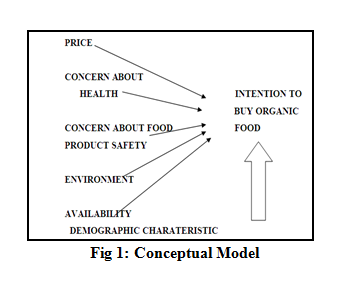
Results and Discussion
Demographic Distribution
Demographic distribution is especially an interest of marketers as it is important to see how population is changing in numbers, and distribution of gender, age, economic situation etc. For example, recent increase of women’s economical activity put them in the first place for companies as women purchase much more than men (Blackwell 2001).
The Table 1 reveals that the 60.8 per cent of consumers belonged to new Bhopal whereas 39.1 per cent of consumers belonged to old Bhopal. Therefore majority of the new Bhopal consumers purchased organic
Products.

The Table 2 shows that the 54.7 per cent of consumers were females whereas 44.8 per cent of consumers were males. Therefore majority of the female consumers purchased organic products.

The Table 3 shows that the age of 39 per cent of consumers was in between 35-45 years, followed by 45-55 years (33.2 %), 25-35 years (17.4%) and above 55 years (10 %). It can be interpreted that the consumers between the age group of 35-45 years were well aware about organic products.
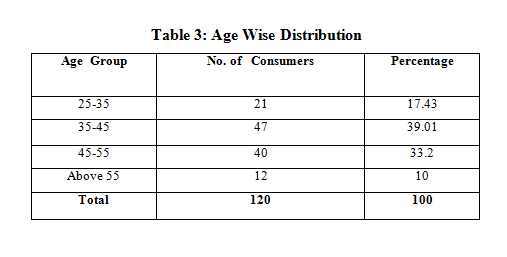
It is visible in the Table 4 that 39.8 per cent of the consumers were from high middle income group, followed by middle income group (37.3%) and high income group (22.4%). Mostly consumers of organic products belonged to high middle income group.
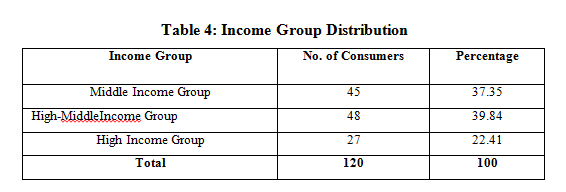
Factors Influencing Buying of Organic Food Products
Majority (78.3%) of the consumers were of the view that organic products had higher price which was a major obstacle to the expansion of organic foods (Table 5). There were 78 per cent of the consumers who were of the view that organic products were environmental friendly and 70 per cent of them considered organic products to be healthier whereas 63.9 per cent were of the view that there was variety of organic products available in the market. Half the percentage of the consumers considered that organic food products were safer whereas 48.5 per cent considered that these had a positive image. Almost 43.5 per cent of them believed organic foods to be of better quality since these were free from pesticides and chemical residues. Only 28 per cent thought that organic foods were fresh.
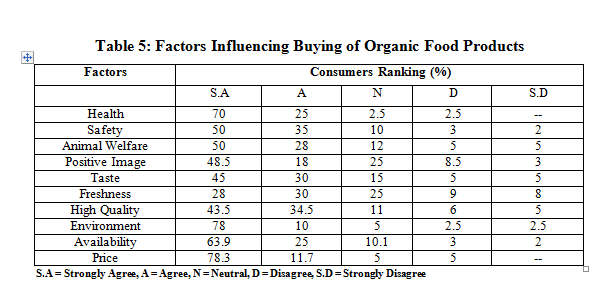
Preferences of the Shopping Places in Bhopal
In order to figure out the most preferred shopping places in the organic food market, Bhopal organic consumers were asked in which places they used to go for shopping when they wanted to buy organic products. Majority (33.3%) of the Bhopal consumers preferred supermarkets, followed by organic shops (26.6%), bazaars (21.66%), farms (10.8%) and specialized shops (7.5).
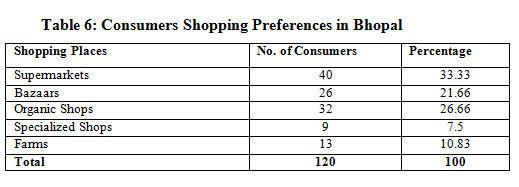
Conclusion
It was suggested that a quality improvement and a smaller price differential between conventional and organic foods were essential in order to increase the proportion of regular organic food buyers.
References
Michaelidous N and Hassan LM (2008) The Role of Health Consciousness, Food Safety Concern and Ethical Identity on Attitudes and Intentions towards Organic Food. International Journal of Consumer Studies (32): 163-170.
TNS World Panel (2008) Health of Britain-Perspectives on Nutrition Research Report. London: TNS.

